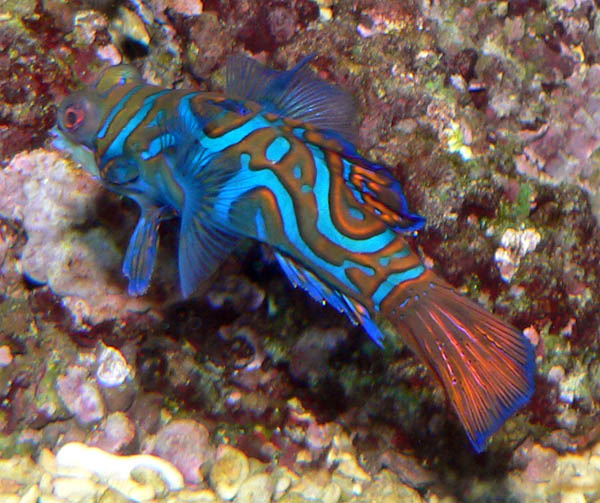|
| Query: picturesque dragonet | Result: 3rd of 3 | |
Mandarinfish (Synchiropus splendidus) - Wiki
| Subject: | Mandarinfish (Synchiropus splendidus) - Wiki
| |

| Resolution: 600x503
File Size: 120995 Bytes
Date: 2005:06:06 12:33:11
Camera: DMC-FZ20 (Panasonic)
F number: f/2.8
Exposure: 10/600 sec
Focal Length: 60/10
Upload Date: 2007:08:13 22:23:36
|
Mandarinfish
From Wikipedia, the free encyclopedia
[Photo] Photo of Category:Synchiropus splendidus (mandarinfish) at the Steinhart Aquarium in San Francisco, taken June 2005 by User:Stan Shebs http://commons.wikimedia.org/wiki/User:Stan_Shebs
The mandarinfish or mandarin dragonet, Synchiropus splendidus (syn. Pterosynchiropus splendidus), is a small, brightly-colored member of the dragonet family, popular in the saltwater aquarium trade. The mandarinfish is native to the Western Pacific, ranging approximately from the Ryukyu Islands south to Australia. It is also somewhat misleadingly known as the mandarin goby, due to its resemblance to blennies and gobies. Other trade names include "green mandarinfish", "striped mandarinfish", or "psychedelic fish". The name psychedelic mandarin is also used for a closely related species, the picturesque dragonet, Synchiropus picturatus.
Mandarinfish are reef dwellers, preferring sheltered lagoons and inshore reefs. While they are slow-moving and fairly common within their range, they are not easily seen due to their bottom-feeding habit and their small size (reaching only about 6 cm). They feed primarily on small crustaceans and other invertebrates. The name of the mandarinfish comes from its extremely vivid coloration, evoking the robes of an Imperial Chinese mandarin.
Despite their popularity in the aquarium trade, mandarinfish are considered difficult to keep, as their feeding habits are very specific. Some fish never adapt to aquarium life, refusing to eat anything but live amphipods and copepods (as in the wild), though individuals that do acclimatize to aquarium food are considered to be quite hardy and highly resistant to diseases such as ich.
The similarly named mandarin fish, Siniperca chuatsi, properly known as the Chinese perch, is only distantly related.
http://en.wikipedia.org/wiki/Mandarinfish
| The text in this page is based on the copyrighted Wikipedia article shown in above URL. It is used under the GNU Free Documentation License. You may redistribute it, verbatim or modified, providing that you comply with the terms of the GFDL. |
|
^o^
Animal Pictures Archive for smart phones
^o^
|
|

